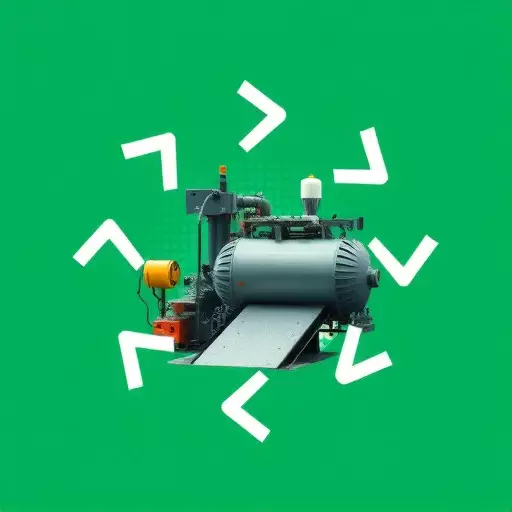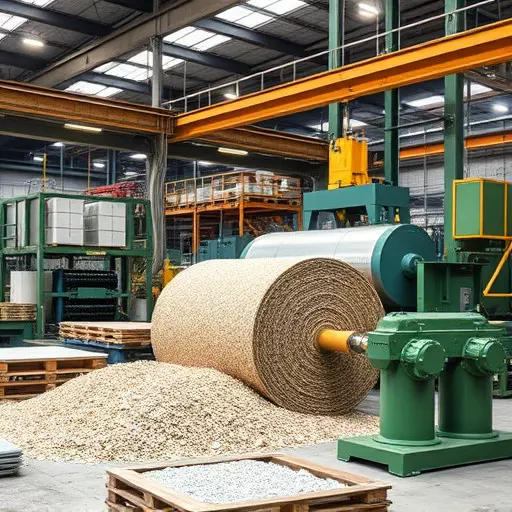Toledo has emerged as a leader in eco-friendly manufacturing through its commitment to closed-loop recycling and achieving a circular economy. By adopting advanced technologies and strategic partnerships, the city's manufacturers are transforming waste into resources, reducing environmental impact, and promoting local economic growth. Through sustainable material processing, Toledo challenges traditional linear models, focusing on resource conservation, waste reduction, and product redesign for durability and recyclability. Despite implementation challenges, successful cases like a leading eco-friendly company's 90% waste recycling rate demonstrate the system's feasibility and benefits. With consumer demand driving change, Toledo's efforts set an example for global eco-friendly manufacturing and contribute to a greener future through its circular economy approach.
“Discover the transformative power of closed-loop recycling, a sustainable approach revolutionizing eco-friendly manufacturing. Explore how Toledo’s initiatives in material processing are leading the way towards a circular economy, reducing environmental impact and redefining production methods.
This article delves into the benefits and challenges of implementing closed-loop systems, highlights successful case studies, and empowers consumers to drive sustainable change. Uncover how choices at the consumer level can foster a circular economy, ensuring a greener future for manufacturing.”
- Understanding Closed-loop Recycling: A Sustainable Approach
- The Role of Material Processing in Toledo's Eco-friendly Initiatives
- Circular Economy: Redefining Manufacturing for a Greener Future
- Benefits and Challenges: Implementing Closed-loop Systems
- Case Studies: Successful Closed-loop Recycling Programs
- Empowering Consumers: Choices that Drive Sustainable Manufacturing
Understanding Closed-loop Recycling: A Sustainable Approach
Closed-loop recycling is a revolutionary approach to sustainable material processing in Toledo and beyond. Unlike traditional linear recycling models, where resources are extracted, used, and then discarded, closed-loop systems aim to create a circular economy. This means that waste materials are continually reused and repurposed within an integrated system, minimizing the need for new raw materials and reducing environmental impact.
By adopting eco-friendly manufacturing practices centered around closed-loop recycling, communities can significantly contribute to a greener future. This innovative method encourages businesses and consumers alike to participate in a sustainable cycle. Through advanced technologies and strategic partnerships, Toledo is leading the way in transforming waste into valuable resources, fostering a healthier environment, and promoting a thriving local economy.
The Role of Material Processing in Toledo's Eco-friendly Initiatives
Toledo’s commitment to eco-friendly initiatives is deeply intertwined with its focus on sustainable material processing. The city has recognized that transitioning to a circular economy, where waste is minimized and resources are continually reused, requires advanced material handling techniques. Therefore, Toledo’s manufacturers have been actively adopting innovative processes like sorting, separating, and refining materials to meet the demands of a greener production cycle.
These eco-friendly manufacturing practices play a pivotal role in the region’s overall sustainability goals. By embracing sustainable material processing, Toledo not only reduces its carbon footprint but also fosters local job creation and economic growth. The closed-loop recycling approach ensures that materials are given new life, decreasing reliance on virgin resources and promoting a more resilient and harmonious relationship with the environment.
Circular Economy: Redefining Manufacturing for a Greener Future
In today’s world, the concept of a circular economy is gaining traction as a powerful solution for sustainable material processing in Toledo and beyond. This economic model challenges the traditional linear approach to manufacturing by encouraging a closed-loop system where resources are continually utilized and reused. Instead of the typical “take, make, dispose” method, eco-friendly manufacturing focuses on reducing waste, minimizing environmental impact, and promoting the circularity of materials. By rethinking production processes, businesses can contribute to a greener future while reducing costs.
The circular economy redefines how products are designed, produced, and consumed, emphasizing durability, reparability, and recyclability. It encourages manufacturers in Toledo to innovate with sustainable materials, creating products that extend their lifespan and easily return to the production chain. This transition not only benefits the environment but also fosters economic growth by stimulating new business models, job creation, and resource efficiency. Embracing circular principles is a game-changer for a more sustainable future, ensuring resources are preserved for generations to come.
Benefits and Challenges: Implementing Closed-loop Systems
Implementing closed-loop systems offers a multitude of benefits for both manufacturers and the environment in the pursuit of a circular economy. By focusing on sustainable material processing in Toledo, these systems enable eco-friendly manufacturing practices. Through recycling and reusing materials, businesses can significantly reduce their environmental impact and resource consumption. This approach fosters a more sustainable future by minimizing waste and maximizing the value of resources.
However, challenges exist when transitioning to closed-loop systems. Effective implementation requires significant changes in production processes and supply chain management. Companies must invest in new technologies for material separation, sorting, and recycling, which can be costly. Additionally, ensuring consistent quality of recycled materials and maintaining consumer demand for eco-friendly products are ongoing hurdles. Yet, with proper planning and collaboration within the industry, these challenges can be overcome, paving the way for a more sustainable and prosperous future in Toledo’s manufacturing sector.
Case Studies: Successful Closed-loop Recycling Programs
Closed-loop recycling systems have proven successful in various regions, demonstrating the feasibility and benefits of sustainable material processing in Toledo and beyond. One notable example is the implementation of a comprehensive program by a leading eco-friendly manufacturing company in the city. By integrating closed-loop practices into their production line, they achieved remarkable results – 90% of their waste was successfully recycled or repurposed, significantly reducing environmental impact. This initiative not only aligns with the principles of the circular economy but also inspired other local businesses to adopt similar strategies.
Another case study highlights a community-driven effort where residents actively participate in recycling and upcycling initiatives. Through partnerships with local manufacturers, they create unique products from recycled materials, fostering a culture of eco-conscious consumption. This approach has led to significant reductions in landfill waste and encouraged the development of green jobs within the community. These successful cases illustrate that closed-loop recycling programs can thrive, contributing to a more sustainable future for Toledo and setting an example for eco-friendly manufacturing worldwide.
Empowering Consumers: Choices that Drive Sustainable Manufacturing
In today’s digital era, consumers are increasingly conscious of their environmental impact and demanding eco-friendly alternatives. This shift in consumer behavior is a powerful driver for embracing sustainable material processing in Toledo and beyond. By making informed choices at the point of purchase, folks can contribute to the growth of a circular economy where resources are reused and recycled indefinitely.
Empowering consumers through education and providing accessible options fosters a culture of responsibility. This ripple effect encourages manufacturers to adopt closed-loop recycling practices, ensuring that materials are continually circulated within a sustainable system. Ultimately, this collaboration between consumers and manufacturers is key to revolutionizing eco-friendly manufacturing and creating a more robust, resilient circular economy.


